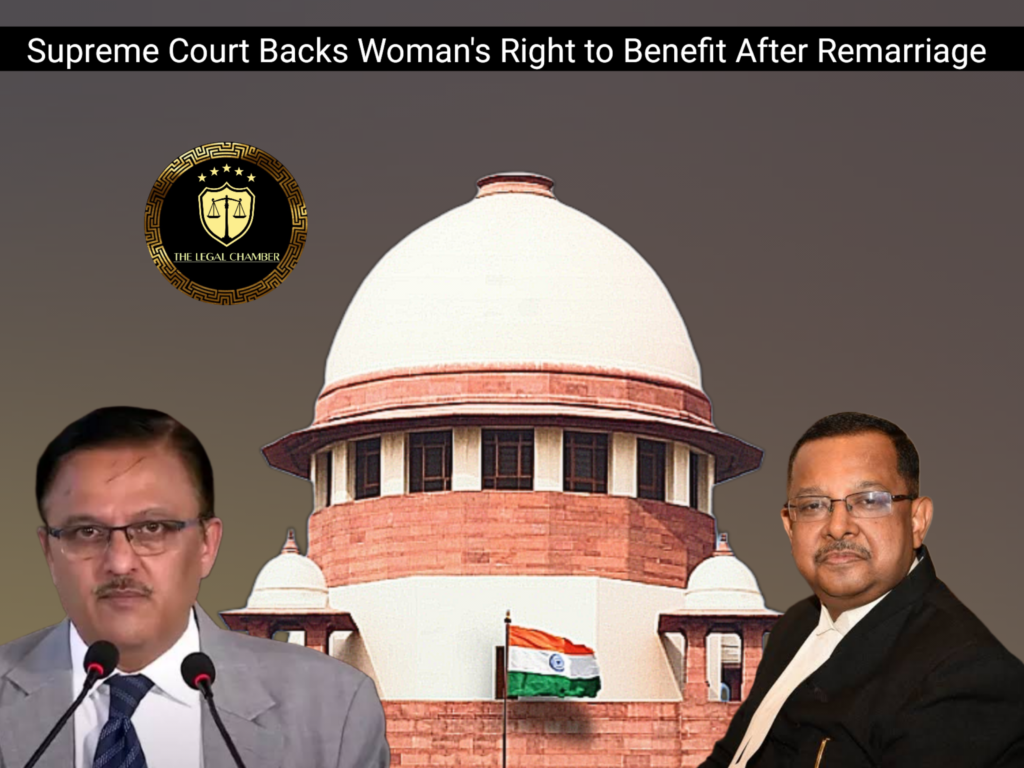
The Supreme Court ruled that K. Umadevi is entitled to maternity leave under FR 101(a), setting aside the High Court Division Bench’s decision. The Court emphasized a purposive and liberal interpretation of maternity benefit provisions, aligning with reproductive rights under Article 21 of the Constitution and international conventions, irrespective of prior children not in the mother’s custody or born from a previous marriage.
Facts Of The Case:
K. Umadevi, the appellant, married A. Suresh in 2006, having two children from this wedlock in 2007 and 2011. Their marriage was dissolved in 2017, and the children remained in the custody of her former husband. In December 2012, she joined government service as an English Teacher in Tamil Nadu. On September 12, 2018, the appellant remarried M. Rajkumar. Due to conceiving a child from her second marriage, she applied for maternity leave from August 17, 2021, to May 13, 2022. However, her request was rejected by the third respondent on August 28, 2021. The rejection cited Fundamental Rule (FR) 101(a), which grants maternity leave to women government employees with less than two surviving children, stating there was no provision for a third child due to remarriage.Aggrieved, Umadevi filed a writ petition (W.P. No. 22075 of 2021) before the Madras High Court. A Single Judge ruled in her favor on March 25, 2022, holding that she was entitled to maternity benefit and setting aside the rejection order, directing the sanction of leave as per G.O.Ms. No. 84 dated August 23, 2021. The Government of Tamil Nadu appealed this decision (W.A. No. 1442 of 2022). A Division Bench of the High Court, through a judgment on September 14, 2022, set aside the Single Judge’s order, concluding that the appellant was not entitled to maternity relief. This led the appellant to file a special leave petition before the Supreme Court
Procedural History:
The appellant, K. Umadevi, initially applied for maternity leave, which was rejected by the third respondent via an order dated August 28, 2021. This rejection prompted her to file a writ petition, W.P. No. 22075 of 2021, before the High Court of Judicature at Madras. A learned Single Judge of the High Court, in a judgment and order dated March 25, 2022, ruled in her favor, setting aside the rejection order and directing the sanction of maternity leave.Subsequently, the Government of Tamil Nadu and its officers filed an intra-court appeal, W.A. No. 1442 of 2022, challenging the Single Judge’s decision. A Division Bench of the High Court, through its judgment and order dated September 14, 2022, found the Single Judge’s judgment unsustainable and set it aside, holding that the appellant was not entitled to the claimed maternity relief. This led the appellant to assail the Division Bench’s judgment before the Supreme Court of India by way of a special leave petition. The Supreme Court issued notice on November 28, 2022, and granted leave on February 11, 2025, converting it into the present Civil Appeal No. 2526 of 2025.
READ ALSO : Supreme Court Late Payment Surcharge Valid: Coal India’s Levy Ruled as ‘Change in Law’
Court Observation:
The Supreme Court emphasized that Article 21 of the Constitution, encompassing the right to life, extends to health, dignity, and reproductive choices. It noted Article 42, a directive principle, mandates the State to provide maternity relief and just working conditions. While FR 101(a) of Tamil Nadu Rules restricts maternity leave based on the number of surviving children, the Court found guidance in the Maternity Benefit Act, 1961, which, though not directly applicable, does not cap the number of children but adjusts the leave period for those with two or more. The Court highlighted international conventions like the Universal Declaration of Human Rights and CEDAW, underscoring global recognition of maternity benefits as fundamental to human rights and equality. Citing Deepika Singh, the Court stressed a purposive and liberal interpretation of beneficial legislation, asserting that a spouse’s children from a prior marriage should not impede a woman’s maternity leave for her biological child. It concluded that population control measures and maternity benefits are not mutually exclusive and require harmonization
Final Decision & Judgement:
The Supreme Court ultimately allowed the appeal, setting aside the judgment and order of the Division Bench of the High Court dated September 14, 2022. The Court declared that the appellant, K. Umadevi, is entitled to maternity leave under FR 101(a). Furthermore, the Supreme Court directed that all admissible maternity benefits due to the appellant be released to her within a period of two months from the date of the judgment. The Court found no merit in the view taken by the Division Bench and, while also not fully aligning with the reasoning of the learned Single Judge, concluded that the appellant was indeed entitled to the relief sought. There was no order as to costs.
Case Details:
Case Title: K. Umadevi versus Government of Tamil Nadu & Ors. Citation: 2025 INSC 781 Civil Appeal No.: 2526 OF 2025 Date of Judgment: May 23, 2025 Judges/Justice Name: Ujjal Bhuyan,and Abhay S. Oka,
Download The Judgement Here